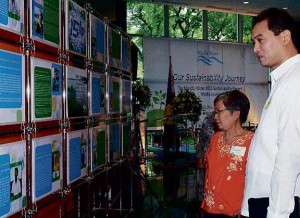Manila Water’s sustainability report: Journey of commitment
MANILA, Philippines—Manila Water recently launched its breakthrough 2011 Sustainability Report by recognizing key personalities that contributed to the accomplishment of the report through their commentaries and testimonials and formally presenting them the report.
The ceremonial turnover was graced by socio-civic luminaries, local government officials and other prominent individuals from the academe and private sector. Various beneficiaries of Manila Water’s sustainability programs were likewise recognized in the event, hosted by Manila Water’s Heidi Demaisip and basketball superstar and eco-warrior Chris Tiu.
In opening the proceedings, Manila Water Group Director for Corporate Strategic Affairs and East Zone Business Operations Ferdinand de la Cruz acknowledges that the report signifies how the company continues to go up the ladder of its sustainability commitment across more dimensions with more stakeholders.
“The 45 testimonies from program beneficiaries and stakeholder partners and commentaries from the panel of seven distinguished sustainability experts humanize the report beyond the 80+ indicators and our areas of improvement,” De la Cruz adds.
As one of expert commentators on the report, Marikina Vice Mayor Jose Fabian Cadiz notes Manila Water’s commitment to provide the same quality service to all of its customers in the East Zone, regardless of how much it costs the company. He particularly cites Upper Homes in Barangay (village) Fortune, where only 50 families reside.
Article continues after this advertisement“Manila Water spent almost P20 million to supply water to 50 dwellings, or 50 families. Lugi, hindi ho ba? But you know, Manila Water is very responsible. That is why they dare to spend P20 million to supply water and energize these dwellings,” shares Cadiz.
Article continues after this advertisementAntipolo City board member Ronald Barcena affirms this by acknowledging Manila Water’s stakeholder approach as a good model for service. “Creating an enabling setting, engaging your people and empowering them. It is good that this company (Manila Water) is employing these approaches and we would like to use this as a benchmark for LGU’s. This sustainability report is all about engagement, it is all about enabling someone and it is all about empowerment,” shares Barcena.
Manila Water’s 2011 sustainability report is the first for a Philippine company that complies with two internationally recognized standards. Apart from complying with the Global Reporting Initiative (GRI) guidelines, as it has for the past eight years, the 2011 report also adheres to the ISO 26000 guidance on social responsibility. This level of compliance is a clear testament to Manila Water’s commitment to embed sustainability in its business operations. For Bonar Laureto, executive director of Philippine Business for the Environment (PBE), the report embodies this commitment. “These things that Manila Water has been doing is a testament that indeed we are in good hands and it assures us that water will be available through time of reasonable perpetuity,” says Laureto.
Former Executive Secretary Oscar Orbos, for his part, says this commitment is evident in the report. “If you are in the business of life, as water equates to life, you should also be in the business of sustainability. The whole report is about the future, it’s about life, and it’s about us and the future generation,” proclaims Orbos.
Based on the updated GRI G3.1 standards on sustainability reporting, Manila Water’s report achieves Level A application and reports on all 85 indicators pertaining to its social, environmental and economic performance. The report likewise tackles the company’s practices with regard to human rights, product responsibility, labor and decent work, and other important themes. The report features some 35 testimonials from stakeholders, as well as seven commentaries from a panel of sustainability experts to validate its accuracy and truthfulness.
The ISO 26000 standards, on the other hand, provided guidance on recognizing social responsibility and stakeholder identification and engagement based on similar indicators as that of GRI, such as organizational governance, environment, labor practices, economic performance, and community involvement and development.
For his closing remarks, Manila Water president and CEO Gerardo C. Ablaza reiterates the company’s three pillars of sustainability: social responsibility, environmental sustainability and economic sustainability. “That is why it’s important for Manila Water to make sure that each of these dimensions is equally healthy and robust. That is our commitment and the report that we are launching today is just our way of communicating the underlying principles behind these pillars,” says Ablaza.
Highlights of the report include a showcase of Manila Water’s policies and practices on employee recognition and labor-management relations, customer-centric programs and community development platforms, environmental stewardship, as well as programs that help fuel the local economy, focusing on grassroots empowerment.
